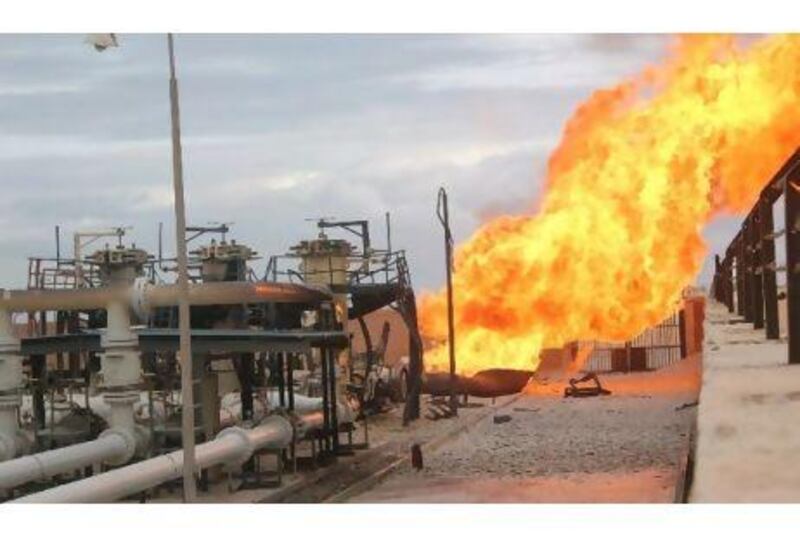TEL AVIV //A gas pipeline in Egypt's northern Sinai Peninsula blew up yesterday, halting exports to neighbouring countries, including Israel and Jordan, and spurring speculation that it may have been a target of saboteurs.
The explosion added to the unrest in Egypt, where an unprecedented uprising by anti-government protesters against the 30-year rule of President Hosni Mubarak has been taking place for nearly two weeks.
The blast went off in the town of el-Arish and spurred the closing of the main source of gas supplying the pipeline. It set off a massive fire that could be seen from kilometres away before it was brought under control, according to the Reuters news agency. There were no casualties.
The Reuters report cited security sources as saying that it was the Jordanian branch of the pipeline that was attacked but that the pipeline to Israel was also shut off as a precaution.
While Egypt's natural gas company said the fire was caused by a small gas leak, the explosion prompted media speculation that Islamist militants might have had a hand in attacking the pipeline to try to sabotage the supply of gas to Israel. The terminal is located in Sinai, a desert area that borders both Israel and the Gaza Strip, a tiny seaside strip ruled by the Islamic group Hamas.
Some Egyptian media reports said that Bedouin tribesmen, the primary residents of el-Arish, might had been responsible. Bedouins have repeatedly clashed with the security forces of Egypt, which they accuse of discrimination, and last July they tried to blow up the gas terminal amid escalating tensions.
A security official who spoke on condition of anonymity told The Associated Press that an explosive device was detonated in the terminal, while the regional governor, Abdel Wahab Mabrouk, was quoted as saying that he suspected sabotage.
Benjamin Netanyahu, the Israeli prime minister, denied in a statement issued by his office that the explosion caused gas supply shortages to the country and added that Israel has alternative energy sources. The statement said: "As a security precaution, Israel temporarily stopped, by its own initiative, the transfer of gas as procedure dictates."
Israel has a considerable reliance on Egyptian gas, which supplies as much as 40 per cent of the country's electricity needs while the rest is provided by a consortium of Israeli and US energy companies. Israel agreed with Egypt in February 2008 on the transport of natural gas, in a deal that called for the supply of 60 billion cubic feet a year for 15 years.
The deal has been controversial in Egypt, where it has fed popular anger against Mr Mubarak's regime. Some people said the government should not supply energy to Israel because of Israel's approach towards the Palestinians. Members of the Egyptian opposition also condemned the deal and claimed the gas was sold at rates that were lower than international market prices.
The volume of gas sold to Israel is small, equal to less than one-tenth of the volume of gas exported each year from Qatar to the United Arab Emirates, for example. Financial details of a revised agreement between Israel and Egypt are confidential, but analysts have estimated that gas exports to Israel bring in well over US$1 billion (Dh3.67bn) to Egypt every year.
The explosion halted the transport of gas to Jordan, where as much as 80 per cent of electricity needs are fulfilled by the Egyptian gas supply, according to news agency reports.
Jordan's National Electric Power Company will use heavy fuel and diesel to keep national power plants running, the AP report said. The report cited Ghalib Maabrah, the company's director-general, as saying that the country has sufficient fuel and diesel reserves to generate electricity for three weeks, but that the shift in energy sources would cause damage worth US$4.2m a day to Jordan.
For the Egyptian economy, the shutdown, which officials said could last up to a week, could add to troubles already spurred by the anti-government protests.
Gas exports have become a major source of hard currency for Egypt, which transports much of the commodity in liquid form by ship to the US and Europe while around 30 per cent travels by pipeline to Israel, Jordan, Lebanon and Syria, according to data from the US government's Energy Information Agency.
cstanton@thenational.ae





